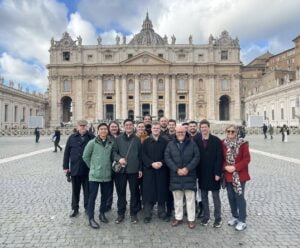Life of a priest
Pastores Dabo Vobis
Priests of tomorrow, priests of today must resemble Christ
PASTORES DABO VOBIS – “I will give you shepherds after my own heart” (Jer 3:15) – the Apostolic Exhortation of St Pope John Paul II written in 1992 to the bishops, clergy and faithful on the formation of priests in the circumstances of the present day comes to us as a promise that the Lord will never leave his Church without priests to guide them. He considers the future formation of priests as the most demanding and important task for the church for the future evangelization of humanity (No.2).
In the formation of future priest, the pope identifies some of the positive and negative elements in today’s context which affect priestly life, tendencies of the contemporary society, and pinpoints the contemporary challenges – consumerism, individualism, materialistic and hedonistic interpretation of human existence, and distortion of human sexuality and freedom – to the present day priesthood. However, he urges us to interpret the situation discerning both positive and negative elements using the gospel called gospel discernment and assures us that with this gospel discernment, we can face the difficulties and challenges of this period and also provide priests for the present, future for the new evangelization (No 10). Though the context may change, the essential aspect of the priest doesn’t change: priests of tomorrow, priests of today must resemble Christ (No.5).
He invites us to have our eyes of faith fixed on the features of Christ reflected in Luke 4:18-19 to get the correct knowledge of the nature and mission of the ministerial priesthood which he considers as an essential presupposition for fostering and discerning vocations to the priesthood and training to the ordained ministry (No.11).
All are called to holiness through baptism, but Pope says priests are bound in a special way to strive for perfection (No.20). Priestly vocation is essentially a call to holiness; it calls for your personal sanctification (No.33). Every priest receives his vocation from our Lord through the church as a gift. We are asked to discern and to live out the proper dynamism of vocation, its gradual and concrete development in the phases of seeking Christ, finding him and staying with him (John 1:35-42) and invites us to engage in the vocational dialogue – each Christian vocation is the history of an inexpressible dialogue between God and human beings (No.36) – appreciating the divine initiative and human response. He warns that modern materials goods, certain social and cultural conditions can, and does impose distorted and false visions about the true nature of priestly vocation; but an engagement in the vocational dialogue helps us to discern and live out the priestly vocation.
Seminary – house of formation – is more than a place, a material space, is a spiritual place, a way of life, an atmosphere that fosters and ensures a process of formation accompanying (No. 42).To ensure this accompanying, the Apostolic Exhortation looks at the human, spiritual, intellectual and pastoral areas of formation.
Human Formation is considered as the basis and necessary foundation of all priestly formation and invites the priest to seek to reflect in himself, as far as possible, the human perfection which shines forth in Jesus Christ which we see in the gospels (No.43). To achieve this Pope encourages the priest to cultivate a series of human qualities which are needed for them to be balanced people, strong and free, capable of bearing the weight of pastoral responsibilities (No. 43/Optatam Totius, 11).
Human formation leads to and finds its completion in Spiritual formation which is the process of becoming ‘son in the Son / rebirth in water and the Spirit’ (No. 45) and a life of prayer. By Intellectual formation candidate participates in the light of God’s mind and seeks to acquire a wisdom which is directed toward knowing God. Through the commitment to study, especially the study of theology, the future priest grows in his spiritual life and pastoral ministry and with his ‘intelligence of heart, he learns to know ‘how to look beyond’ (No 51). Pastoral formation aims at preparing candidates to enter into communion with the charity of Christ the good shepherd (57) and makes the future priests live out as a “service” his own mission of “authority” in the community, setting aside all attitudes of superiority or of exercising a power if it is not that which is justified by pastoral charity.
Rekindle / stir into flame the divine gift the priest has received. It is to welcome the divine gift and live it out without ever losing that ‘permanent novelty’ of the divine gift (70). Ongoing formation of priests calls for continual personal growth, maturity and constant updating among priests.
“I will give you shepherds after my own heart” (Jer 3:15). This promise is still living and at work in the church today. Pope John Paul II ends his apostolic exhortation, Pastores Dabo Vobis by appealing on the families to be generous in giving their sons to the Lord; the young people not to be afraid to open their minds to Christ the Lord who is calling them and the priests to rekindle daily the gift of God they have received and to renew their devotion to the Virgin Mary, the Mother of priests, by praying to her and imitating her virtues.
Your vocation path
Meet our Seminarians
Propaedeutic Stage



Antony Sebastian Edward Mbongu Kalepo Misi

Penitito Sagato
Discipleship Stage



Charles Nguyen Godwin James Harold Conrod



Dylan Asmus Gabriel Guillaume Grant Sutherland
Pastoral Internship


Configuration Stage
Sean Woods

